|
|
|
|
|
|
|
Sets were for use on the government's AUTOVON (AUTOmatic VOice Network) system, which connected sites worldwide. It's key features include the ability to use 4-wire connections to minimize echo on long distance connections, the use of priority codes to give preference to higher priority communications when the system was operating at capacity, "hot line" dialing and conferencing. A brief overview of the system may be found in "Bell Laboratories Record," April 1968. An internet search on AUTOVON will provide more technical details and background information. PRIORITY LEVELS
The appropriate priority code was dialed with an "important" call, such as a command and control call. If needed, calls starting with routine level and going up to the level below the dialed level were preempted. The lower priority users got a tone sequence indicating their call was being preempted. Standard 500 and 2500-series sets were used for routine callers, who did not have the need or authority to preempt other callers. They may be found on other pages of this site (see links above). BSPs for Autovon sets were moved from division 502 to division 529 when it was created for "Station Apparatus and Equipment intended solely for specially-engineered lines, not for general telephone use." This happened sometime before the publication of the 10/68 division 502 index. This information is hard to find, as the BSPs and technical data were not generally distributed. Later division indexes had a heart icon next to the BSPs, indicating: "a new or reissued item which, because of its limited need, will not be distributed on standing order except through coded distribution. Additional copies may be obtained by placing regular (one-time) orders." This page is intended to be a quick summary of the models produced and major functions. Western catalogs and technical documentation only show the models that were in production or service at the publication date. To understand the full scope of models produced we must compile data from many years of documents. Each model had suffix letters that defined variations. Details can be found in the Bell System technical documentation (e.g. BSPs - Bell System Practices). Most info in the chart is from manufacturer catalogs and ads plus discussions on the ATCA and TCI listservs. No claim is made regarding accuracy or completeness. For more information, see my article "Top Secret Telephones," the cover story in the April 2011 issue of TCI's Singing Wires, and search for Autovon in the TCI Library. www.telephonecollectors.info/ If you're enjoying looking at this level of detail and haven't joined one of the phone clubs yet, see the links page. If you're identifying a phone, you still need to check the internal components as many phones were refurbed and had internal components changed or removed. If done in a Bell System refurb facility, the code on the bottom was usually repainted or remarked. Many independent shops or field mods were not remarked with the accurate model number. When buying sets, watch out for standard phones that have been modified to look like Autovon sets, by replacing the dial and faceplate. While these look like proper sets to the casual observer, closer scrutiny will generally show the lack of a ringer control on the left side (sets with N1A ringer), the required 4-wire circuitry inside and the proper markings on the bottom plate. 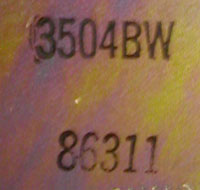
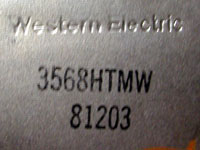 As with the 500 seeries, a W suffix indicates sets made without Bell System markings, and M indicates a Modular set. More details on set coding are found on the 500-series page. For color information, see: Phones in color! This page is a work in progress. Please send comments, additions and corrections. Last update: 21 December 2021 |
|
Model
|
Major Functions
(all are desk sets unless noted otherwise.) |
|
| Single
line desk set. Factory wired for 4-wire service, but
may be arranged for 2-wire service. Equipped with a card-operated line switch, 66-series dial, N1A ringer, 425G network, exclusion switch, G3AR handset, polarity guard, D24E mounting cord. 3504B has opaque keys. 3504C has translucent (illuminated) keys. Wired for speakerphone use. N1A ringer control is accessable on the left side of the housing. |
502-532-107 502-532-437 (I1, 11/66) 529-235-102 Apparatus Catalog, 1970, p. 595 |
|
3568 HH/HT 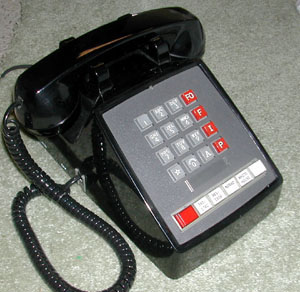 |
6-button
keyset.
66-series dial, N1A ringer, 425G network, exclusion
switch, G3AR handset, polarity guard, D50W mounting
cord. MA4 relay for 2 or 4-wire operation. 3568HT has opaque keys. 3568HH has translucent (illuminated) keys. Wired for speakerphone use. N1A ringer control is accessable on the left side of the housing. |
502-532-110 502-532-440 529-235-135 |
3640 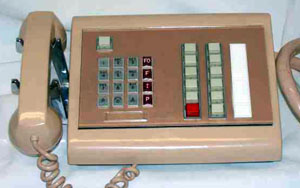 |
Call
Director. 66-series dial, T1A or N1A ringer, 4010B
or 4228F network, exclusion switch, G3Y handset, polarity
guard, D50W mounting cord. MA4 relay for 2 or 4-wire
operation. 3640 holds up to 18 buttons in 3 columns. 3641 holds up to 30 buttons in 5 columns. Last letter A has opaque keys. Last letter B has translucent (illuminated) keys. 672A transmitter may be installed in the last module position for use with 3-type speakerphone. |
502-640-100 502-640-400 529-236-120 |
3666 A1A/A1B 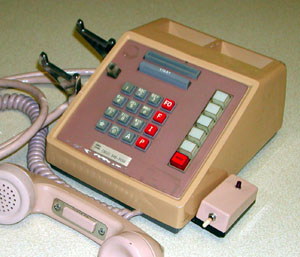 Photo from
Wayne Merit
|
Card
Dialer, 6-button keyset. 67-series dial, M1A ringer,
425G network, exclusion switch, G3AR handset, polarity
guard, D50W mounting cord. MA4 relay for 2 or 4-wire
operation. 3666A1A has opaque keys. 3666A1B has translucent (illuminated) keys. Wired for speakerphone use. Information on other Card
Dialers -- WE Card Dialers
|
502-666-100 502-666-400 (I1, 1/66) 529-236-133 |
3756A 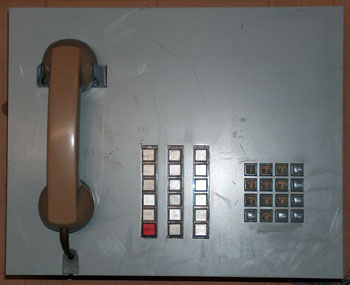 Photos from
Rick Walsh
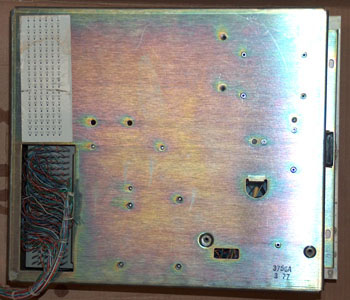 (Back view) |
Panel phone 66A3C (2-77) dial has generic keycaps with clear plastic windows for insertion of application-specific legends on * and # keys and right column keys. The set has a network, polarity guard, and a receive
amplifier board. It appears to be a 2-wire phone
that generates the 16 tones.
Used in ESS test frames and possibly Autovon installations. - - - - - - -
From the Catalog Card dated 10-31-1979 Common battery, TOUCH-TONE® dial,
18-button illuminated panel-type key telephone set
designed for flush mounting on a trunk test frame in a
No. 2 ESS 2-wire office. Designed for use in No. 1A1
and 1A2 key telephone systems.
Equipped with a P-23F754, gray, metal face plate attached to the frame by means of magnetic catches and may be readily removed for maintenance purposes. (r)Contains Hand Set: G3K-61(r) In addition to the apparatus listed, set also contains a No. 4228T network, No. 241A amplifier, No. 186A network, KS-8110 L2 buzzer, a polarity guard assembly, a line switch assembly, and a cable assembly. The spring combinations associated with the six pushbuttons of the No. 635Y5C key provide a HOLD (Red), a RELEASE(Green), a FLASH (Amber) , and three line PICKUPS (Clear) which are convertible for signaling. The spring combinations associated with the six pushbuttons of the No. 635C5C keys provide six line pickups on each key withall pickups convertible for signaling. All pickup key buttons are each illuminated with a No. 61A lamp and serve as line busy, held line, and/or incoming call signals. Interchangeability of any line pickup to any pickup button on each key is provided by plug-in connectors on the back of the key frame. A No. 251D terminal strip provides gun-wrapped type terminals for all external connections to the set. Arranged for mounting but not equipped with a D-180387 kit of parts (ordered separately when required) which provides an electromagnetic transmitter, a loud speaker, a 3-stage transistor-type amplifier, a key and volume control unit, and a special face plate for use in the 3 type speakerphone system. Also arranged so that an operator head telephone set may be switched into the telephone circuit by external switching relays. Initial use: On Trunk Test Frame No. 2 ESS 2-Wire Office. |
WE Catalog Card |
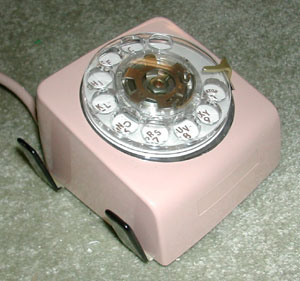
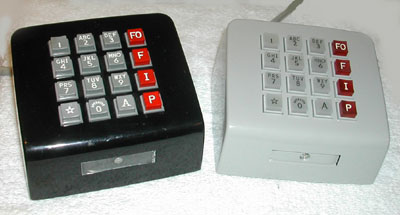
| Model | Major Functions | BSP |
| 66 type dials |
16-button dials with
Autovon-specific keys: "star," A, FO, F, I and P. Available with opaque or translucent (lighted) keys. (Photo above right.) |
501-164-123 529-120-106 |
|
67
type dials |
Card
Dialer with 16-button dial with Autovon-specific keys:
"star," A, FO, F, I and P. |
501-164-124 529-120-106 |
| 1008 |
Adjunct with rotary
dial, for addition to AUTOVON sets. (Photo above
left.) Used when an AUTOVON set user dialed out to a line that supported only rotary dialing. |
501-164-127 529-120-112 |
| 1066 |
Adjunct with AUTOVON
dial. (Photo above right.) |
529-120-116 |
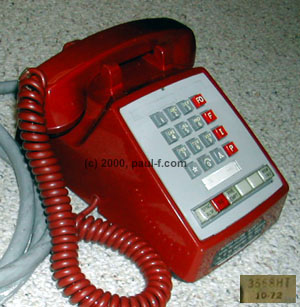 |
|
||
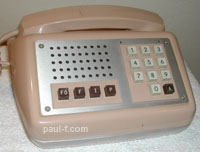 |
Automatic Electric Autovon
Set Built in the same housing as the AE880 speakerphones and similar products. See: speakae.htm |
||
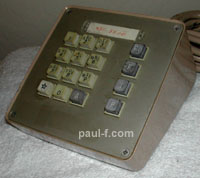 |
Automatic Electric Autovon
Adjunct |
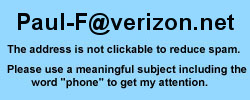
|
©2007-21 paulf. All rights
reserved.
|